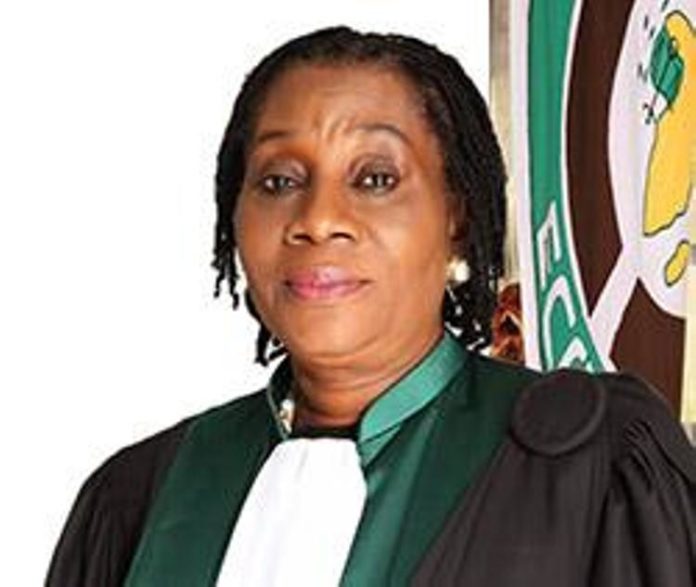The Federal Republic of Nigeria was on Tuesday, 26th February 2019 ordered by the ECOWAS Court of Justice to investigate the 2016 mass killings and destruction of properties in the Agatu Community in Benue State, identify and prosecute the perpetrators and redress the victims.
Delivering judgment in a suit brought by a catholic priest, Reverend Father Solomon MFA and eleven others, a three member panel of the Court found the government in ‘violation of their obligation to protect the human rights of the Agatu Community and prevent its violation.’
In suit no: ECW/CCJ/APP/11/16 Reverend Father Solomon MFA and the 11 others namely: Reverend Joseph Dooga, Dr. Sam Abah, Dr.David Iordaah, Hon. Ochepo Yakubu, Hon. Terse Tange, Favour Adah Paul, Samuel Msonter Ijoho, Iorbee Bajah, Ashi Bajah, Terseer Iorbee Bajah and Movement Against Fulani Occupation(MAFO) had sued the President of Nigeria, the Inspector General of Police, the Chief of Army Staff and the Minister of Internal Affairs alleging the violation of their fundamental human rights.
The Applicants claimed that within the last three years, Fulani Herdsmen have carried out over 50 (fifty) major attacks on Benue communities the most prominent of them taking place in 15 out of 23 Local Government Areas of the State namely, Agatu, Gwer East, Gwer West, Makurdi, Guma, Tarka, Buruku, Katsina Ala, Logo, Ukum, Kwande, Oju, Obi and Konshisha.
Furthermore, they alleged that affected communities have been completely overwhelmed and are now desolate and devastated as they have suffered wanton destruction of their properties and lives including: burning down and general destruction of houses and homes, sundry household items, farms, crops, economic trees, vehicles, machineries, food stuffs, schools etc.
The plaintiffs claimed that over 1000 people have been killed, according to documents filed before the Court with hundreds of thousands displaced while others are living in deplorable make shift camps and properties worth billions of naira destroyed in their communities by these ravaging Fulani Herdsmen this year alone.
They claimed that the action of the Defendants’ by not constituting an investigation panel nor taking measures to forestall a reoccurrence, amounted to negligence, was oppressive, arbitrary, capricious, and for Injuring the dignity and pride of the Applicants and for causing them great physical and psychological trauma.
The court was presided over by the President, Honourable Justice Edward A. ASANTE, but the judgment was read by Honorable Justice Dupe Atoki, wherein the Court also ordered the government to provide adequate security by deploying more security personnel to the ‘area to protect the Community and prevent further occurrences of that mayhem.’
Relying on Article 1 of the African Charter on Human and Peoples’ Right, to which the country is signatory, the Court held that in ‘view of the fact that the mass killings and destruction were admitted by both parties and uncontroverted therefore need no proof, the Respondent is under obligation to recognize the rights enshrined in the charter and adopt legislative or other measures to give effect to them.’
In other words: ‘the Respondent is obliged to protect the human rights of its citizens, in the instant case, the Agatu communities as guaranteed under the African Charter and prevent their violations even by private actors.’
The Court had earlier rejected the argument of the defendants contesting the locus of the plaintiffs by holding that the law recognizes the right of individuals and corporate bodies who are not victims to bring an action in a representative capacity under the principle of Actio Popularis.
“The Court under this situation will allow NGO’s and Public spirited individuals to institute actions on behalf of group of victims usually from a community or class of people based on common public interest to claim for the violation of their human rights, because this group may not have the knowledge and the financial capacity to maintain legal action of such magnitude which affects the general public interest.”
The Court also rejected the contention of the Defendants that they cannot be held responsible for any ethnic crime committed by unidentified and unknown persons which constitute a breach as these perpetrators are not connected or known to the Defendants or any of its agencies.
The Court however ruled that it could not award the monetary compensation of five hundred billion naira demanded by the plaintiffs as it has no record of the details of the victims, their names, gender, age, address while the properties destroyed have also not been specifically identified nor their value indicated.
Counsel to the first to fourth Defendants, Mr. Dayo Apata, had blamed the crisis that engulfed the State and its environment on ethnic differences between the Agatu community and the Fulani community over farming and rearing of animals as has been established by various panels of enquiry set up at different times in a bid to proffer solution.
He said that the crisis between the two rival communities are not based on security lapses or the inability of the Federal or State Governments to protect the lives and properties of the people of state as security agencies were deployed to the Agatu community for the purpose of ensuring the protection of lives and properties in the interest of peace and security.
The third member of the panel was Honorable Justice Keikura Bangura.
Source: Ecowas Court
















